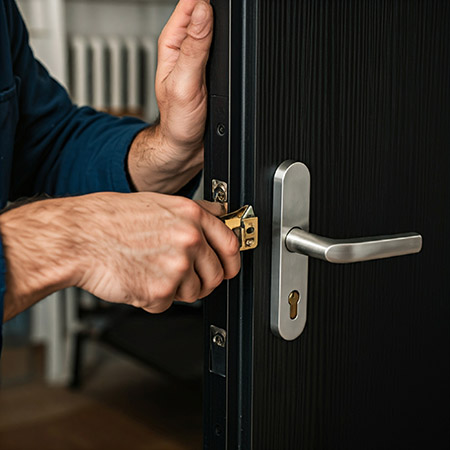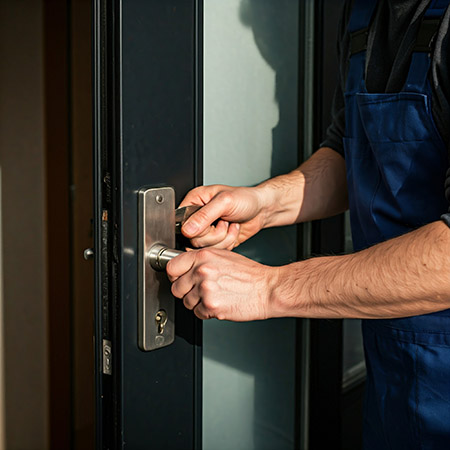 Replacing your home’s locks is a critical part of maintaining security and safeguarding your property. Understanding when to replace your door locks can help prevent break-ins and ensure peace of mind. In this guide, we’ll cover when it’s the right time to replace your locks and what to consider when choosing new ones.
Replacing your home’s locks is a critical part of maintaining security and safeguarding your property. Understanding when to replace your door locks can help prevent break-ins and ensure peace of mind. In this guide, we’ll cover when it’s the right time to replace your locks and what to consider when choosing new ones.
Is it advisable to change locks after moving into a new home?
Absolutely. One of the first things you should do when moving into a new home is to change the locks. Even if you trust the previous owners, there’s no way of knowing how many people have copies of the keys. Real estate agents, contractors, or maintenance workers could still have spare keys, which puts your home at risk. Replacing the locks gives you complete control over who has access to your home, ensuring your safety and offering peace of mind. It’s a small investment that provides significant security, making it a simple yet crucial step in protecting your new home.
What are the signs that indicate it’s time to replace door locks?
Several signs suggest your door locks may need replacing. First, check for visible damage. Rust, corrosion, or wear on the lock components are clear signs that the lock is deteriorating. Outdoor locks, in particular, are more exposed to the elements and tend to wear out faster, so it’s essential to inspect them regularly.
If you’re having trouble operating the lock, such as difficulty turning the key or noticing that the door feels loose when locked, this is a red flag. Locks that require extra force to open or close likely have internal damage, which can compromise their security.
Frequent lockouts are another warning sign. If you’re often locked out due to a malfunctioning lock, it’s time to consider replacing it. If you’ve lost your keys or had them stolen, replacing the locks becomes even more critical. If you suspect someone else has access to your keys, it’s better to be safe than sorry. New locks ensure that only you can control who enters your home.
Lastly, if your home has been broken into or targeted in an attempted break-in, replacing the locks is a must. Even if the locks weren’t physically damaged during the break-in, they may no longer offer the level of security you need. Installing stronger, more secure locks after a breach can help prevent future incidents and keep your home safe. By addressing lock issues early, you can maintain a safer home and reduce the risk of security threats.
How often should I check the condition of my door locks?
It’s a good idea to inspect your door locks at least once a year to ensure they’re in proper working condition. Regular checks allow you to spot early signs of wear and tear before they turn into more serious problems. Look for any visible rust, corrosion, or damage on the lock, as these are clear indicators that the lock may not be functioning properly.
Pay attention to how the lock operates—does the key turn smoothly? Does the door lock securely when closed? Any difficulty turning the key or resistance could mean there’s internal damage that needs attention.
Also, listen for any unusual sounds, such as grinding or clicking, when locking or unlocking the door. These noises could signal mechanical issues within the lock, which could reduce its effectiveness over time. Make sure the door aligns properly and the lock engages smoothly, without wobbling or resistance. If you notice any of these issues, it’s a good idea to call a locksmith for a professional assessment. They can give you a more thorough evaluation and recommend whether repairs or replacements are necessary.
Routine maintenance not only helps identify issues early but also extends the life of your locks, ensuring they continue to protect your home reliably. A proactive approach to lock care can save you money in the long run by preventing costly repairs or replacements. Plus, regular checks give you the peace of mind that your home’s security is up to scratch.
How long do door locks typically last before needing replacement?
On average, door locks last between 7 to 10 years, depending on their quality and how often they’re used. High-quality locks made from durable materials tend to last longer if maintained properly, while cheaper locks might need replacing more often. Exposure to the elements, especially in coastal or harsh weather conditions, as well as frequent use, can shorten their lifespan.
If your locks are approaching the 7-10 year mark or showing signs of wear, such as difficulty turning the key or visible damage, it’s a good idea to consider replacing them to ensure continued security. Investing in higher-quality locks can provide better long-term protection and may save you money by reducing the need for frequent replacements.
Factors to Consider When Replacing Locks
 When replacing your door locks, it’s essential to consider several factors that will impact both your security and convenience. By evaluating these elements carefully, you can choose the right locks to fit your needs and ensure your home remains well-secured.
When replacing your door locks, it’s essential to consider several factors that will impact both your security and convenience. By evaluating these elements carefully, you can choose the right locks to fit your needs and ensure your home remains well-secured.
Start by assessing the security of your current locks. If they’re outdated, damaged, or easy to bypass, it’s a clear indication that an upgrade is in order. You should also take into account the safety of your neighbourhood and any specific security concerns your home might face. For example, if you live in an area with a higher risk of burglary, opting for high-security locks or more advanced systems could offer better protection.
The type of lock you choose is another key consideration. Deadbolts are popular because they provide stronger protection than standard knob locks, while smart locks offer additional features like keyless entry and remote control. If you require more robust security, consider high-security locks designed to resist tampering and unauthorized access.
Your budget will also play a significant role in your decision-making. Lock prices can vary widely, so setting a clear budget is crucial. Keep in mind that advanced models, such as smart locks or high-security options, are generally more expensive. Don’t forget to factor in the potential cost of professional installation, as some locks, especially smart locks, may require more technical expertise to set up.
Another aspect to think about is the installation process. Basic locks can often be installed on your own, but more advanced models, particularly smart locks, might require professional installation. Be sure to include these additional costs in your budget, especially if the lock involves integration with home automation systems or electrical wiring.
Finally, don’t overlook the aesthetic appeal of the lock. For exterior doors, it’s important to choose a lock that not only enhances security but also fits the style and design of your home. Look for a balance between functionality and appearance to ensure that the lock complements your home’s overall curb appeal while providing the protection you need.
What Security Features Should I Look For?
When upgrading your locks, security should be your primary focus. For reliable protection, high-quality deadbolts are a must. These provide strong, physical security to deter intruders. If convenience is important to you, consider smart locks, which offer keyless entry and remote access. Many smart locks also feature user management capabilities, allowing you to monitor who is entering and exiting your home at any time.
For electronic locks, look for models with tamper detection. This feature alerts you immediately if someone attempts to manipulate the lock, providing an added layer of security. It’s also important to choose locks that are weather-resistant, especially for exterior doors, as this will help protect against rust and corrosion caused by exposure to the elements. Additionally, make sure your electronic locks come with battery backup options to ensure they continue to function during power outages or when the battery is running low.
By considering these security features, you can select locks that not only provide superior protection but also suit your specific needs and preferences.
Conclusion
In conclusion, replacing your locks is a critical step in safeguarding your home. By recognizing the signs that it’s time for a change and taking into account factors such as lock type, installation complexity, and key security features, you’ll be able to make informed decisions that best meet your needs. Whether you’re moving into a new home or simply reassessing the condition of your current locks, taking proactive steps to upgrade your security will provide peace of mind and protect your home from unauthorized access. Investing in high-quality locks and maintaining them properly ensures a safer, more secure environment for you and your family.
